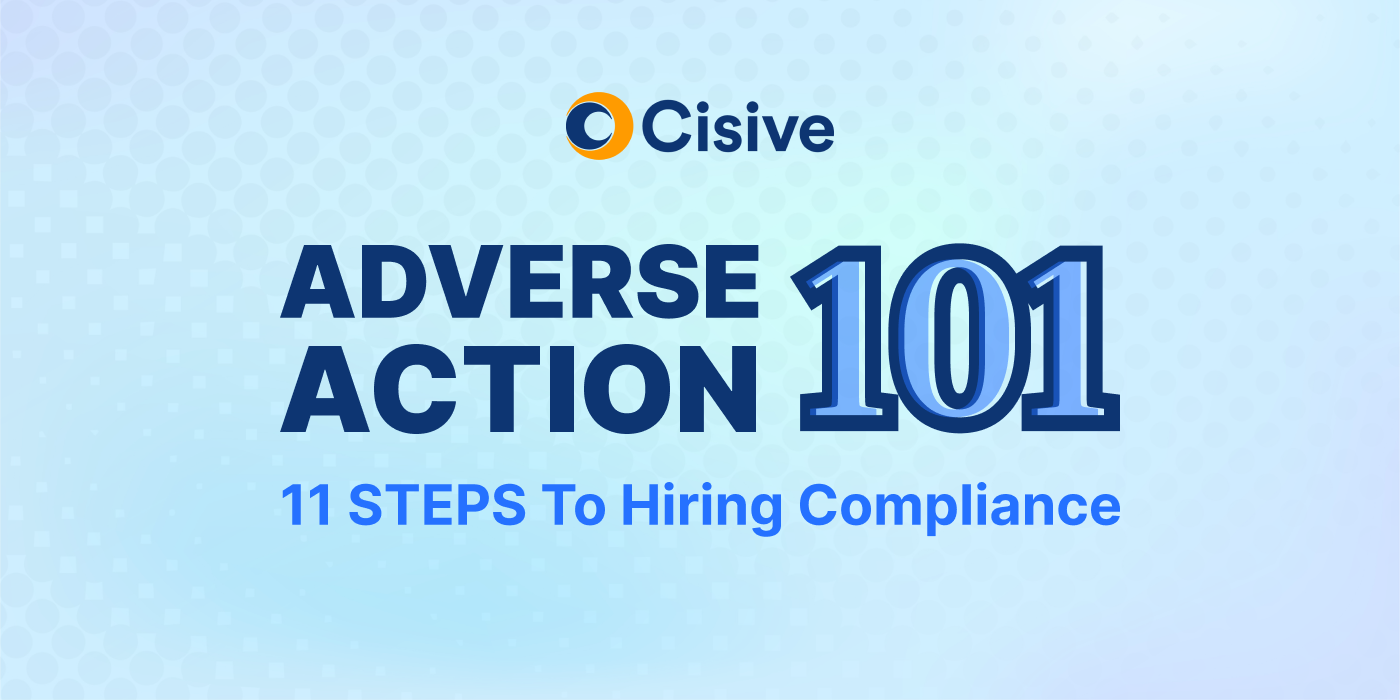
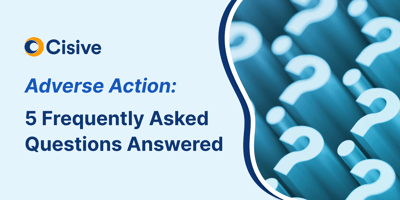
Understanding how the adverse action process works is crucial to staying on the right side of the...

Employers rely on background checks to maintain a safe and productive work environment. As you vet potential hires, you must also meet legal obligations related to adverse action whenever you use background checks.
There’s a lot at stake when making employment decisions, and background check reports can figure heavily in your decisions. Before taking adverse action against a candidate or employee, you need to establish clear protocols for compliance.
Discover the laws and essential guidelines for employers to develop and maintain background check processes that align with adverse action compliance throughout the hiring process.
Key Takeaways:
|
To fully grasp the significance of adverse employment action, you need to understand the concepts and key terms. Here are some of the concepts related to adverse action, and how they align with background check compliance.
Adverse employment action refers to any negative action taken by an employer against an employee or job applicant that affects their employment status, terms, or conditions.
For existing employees, such actions include termination, demotion, suspension, denial of promotion, or reduction in pay or benefits. For candidates, adverse action results in not getting hired.
Adverse employment actions are typically taken because of performance issues, policy violations, misconduct, or other factors considered detrimental to the employer's interests. Adverse employment actions must follow applicable laws and regulations, such as anti-discrimination laws.
Adverse action in background checks refers to when employers take negative action against a job applicant or employee based on information from a background screening report.
This typically happens when the background check reveals relevant information, such as criminal records, credit history, or possibly a discrepancy on previous employment or education verifications.
However, before taking adverse action, federal law requires employers to provide the individual with a pre-adverse action letter, a copy of the background check report, and a reasonable opportunity to dispute the accuracy of the information.
This process is designed to protect individual rights and ensure that adverse action is based on accurate and fair information.
Adverse action refers to the negative employment decision taken by an employer based on information obtained from a background check. This decision could include denying employment or terminating employment, including many other potentially negative outcomes.
Adverse impact refers to a situation where a particular employment practice or policy — such as the use of background checks — disproportionately affects individuals from a protected class (e.g., race, gender, age).
This disproportionate impact can occur even if the policy is neutral on its face. Adverse impact can occur when the use of background checks results in an unusually high rate of exclusion or adverse action against members of a protected class.
Employers should ensure that their policies around screening are job-related, consistent with, and limited to business necessity.
They should also consider alternative methods of evaluating candidates that may reduce adverse impact while still achieving their legitimate business objectives. Failure to address adverse impact can lead to discrimination claims.
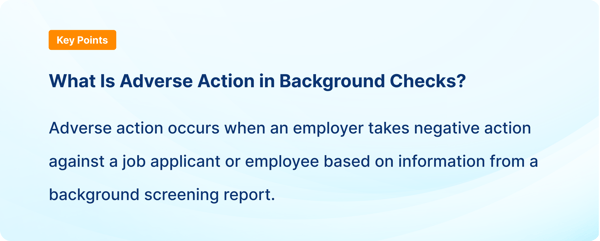
Legislation plays a vital role in governing the adverse action process during background screening. Here are some of the regulations you need to follow to maintain a compliant hiring process.
Obligations regarding adverse action in background checks for U.S. employers are primarily outlined in the Fair Credit Reporting Act (FCRA). The FCRA sets requirements for employers when using consumer reports — including background checks — for employment purposes.
It establishes guidelines for obtaining and using consumer reports, as well as what employers must do before taking adverse action based on such information.
The federal Equal Employment Opportunity Commission (EEOC) provides guidance on how employers should consider arrest and conviction records in employment decisions to avoid discrimination.
Regarding arrest records, the EEOC states: “Although an arrest record standing alone may not be used to deny an employment opportunity, an employer may make an employment decision based on the conduct underlying the arrest if the conduct makes the individual unfit for the position in question. The conduct, not the arrest, is relevant for employment purposes.”
According to the EEOC, criminal history “will usually serve as sufficient evidence that a person engaged in particular conduct,” although the commission recommends that employers consider whether such convictions meet the standard for job-related exclusion.
NOTE: Although the FCRA generally permits use of arrest records for employment decisions, many State laws now PROHIBIT their consideration and use.
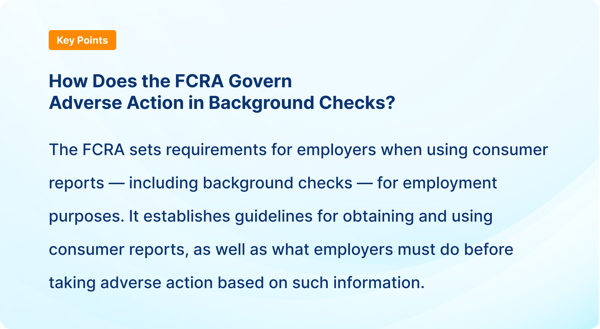
To navigate the complexities of adverse action compliance in background checks, employers must follow a well-defined process that upholds fairness and legal obligations. The following steps outline a comprehensive approach that ensures compliance and protects the rights of all parties:
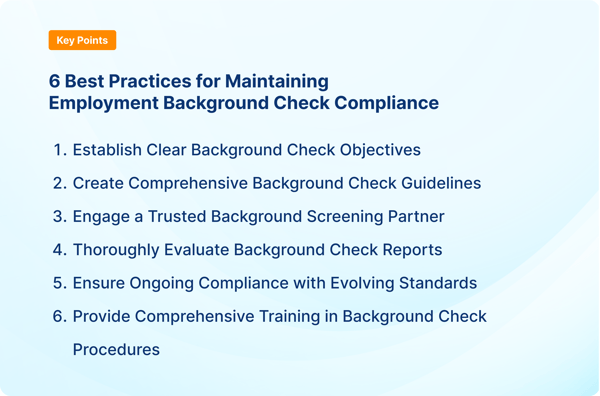
To maintain background check compliance, you need robust processes that prioritize fairness, accuracy, and legal adherence. Consider applying the following best practices to help your organization navigate the intricacies of background check compliance.
Clearly define the purpose and scope of background checks to ensure they're job-related and necessary for business operations.
This involves identifying the specific information needed to make informed employment decisions and making sure that the checks align with legal requirements and industry standards. Only request the information needed to make a fair risk based assessment for the job in question, avoid gathering information that is unnecessary to the decision.
Recently, more employers have begun implementing continuous background checks on existing employees.
While certain highly regulated industries require post-hire background checks, it’s not a requirement across the board. If you choose to implement ongoing employee screenings, you need to establish clear reasons for doing so, along with consistent protocols for addressing the results.
Develop a written policy that outlines the background check process, including the types of checks conducted, evaluation criteria, and the steps involved in adverse action.
This policy serves as a reference for your HR team and hiring managers, providing consistency and transparency throughout the process.
Large employers operating across multiple states or municipalities may encounter slight variations in compliance requirements depending on the jurisdiction.
Some states have requirements that go beyond the FCRA, for example. Consider HR and hiring managers might need to alter their background screening practices across locations.
To account for these legal differences, consider developing a policy that adopts the strictest possible rules your organization faces and applies those rules across the business. This makes compliance simpler and reduces the risk of costly mistakes.
Consider engaging with a trusted background screening partner to improve your processes and compliance.
Reputable screening partners have the expertise and knowledge to navigate the complex landscape of background check regulations. They stay current with the latest rules and best practices.
Trusted screening partners use advanced technology and resources to conduct thorough and accurate background checks. They have access to comprehensive databases and employ robust screening tools. They reduce the risk of overlooking critical information or making compliance errors.
When selecting a partner in this process, consider their compliance track record, reputation, technology, and level of customer support. As part of this process, evaluate their technology infrastructure and data security measures. Make sure that they have robust systems in place to protect sensitive information and maintain confidentiality throughout the screening process.
Meanwhile, a trusted screening partner should be readily available to address concerns or questions, providing guidance and support throughout the entire background check process.
Valid, reliable, and accurate information in the background process is crucial. Relying on inaccurate or outdated information can lead to unfair treatment of applicants or employees — and potential legal consequences.
Unfortunately, recent research has revealed a decline among North American employers, with only 49% prioritizing accuracy in 2023 — down from 75% previously.
Implement a systematic review process to ensure accuracy in background check reports. This involves comparing the report’s information with the applicant's or employee's self-reported details, such as employment history, education, and personal information.
Discrepancies and inconsistencies should be investigated and verified through additional sources or direct communication with the individual.
Additionally, document the review process, including actions taken to resolve discrepancies. This documentation serves as evidence of your commitment to accuracy and compliance and could be valuable for any legal or regulatory proceedings.
Finally, work with a background screening partner to quickly vet the information contained in a background check report. A partner can help keep your hiring processes running smoothly without sacrificing accuracy.
Laws and regulations related to background checks are subject to change. By continuously tracking and adjusting processes, organizations can ensure that their background check procedures align with the latest standards.
Establish a system for tracking changes in background check regulations and disseminating such updates to your workforce. This can involve subscribing to industry newsletters, participating in professional networks, or consulting legal experts.
A trusted background screening partner, such as Cisive, can provide resources and advice to help you maintain compliance.
Regular training and education for HR and other employees involved in the background check process is also crucial.
They must be educated about the latest compliance requirements, how to perform background checks, and how to avoid common mistakes that can lead to noncompliance.
Develop a structured program that covers all aspects related to background screening compliance. Topics can include legal requirements, industry standards, internal policies, and the proper use of screening tools in making hiring decisions.
Tailor the training to specific roles and responsibilities within the background check process.
By prioritizing compliance with adverse action background check requirements, you can foster a transparent and equitable hiring process, build trust with stakeholders, and safeguard your business against potential legal risks.
In today's highly regulated environment, partnering with a background screening provider is a business necessity. Schedule a call with one of our background screening experts to find out how Cisive can support your adverse action background check compliance measures.
Author: Michael Kendrick
Bio: Senior Manager of Corporate Compliance at Cisive.
Let's Connect on LinkedIn
Understanding how the adverse action process works is crucial to staying on the right side of the...

Comprehensive background checks can alert employers to potential issues with prospective...

You've probably felt the pressure to hire quickly. At the same time, you’re managing interviews,...